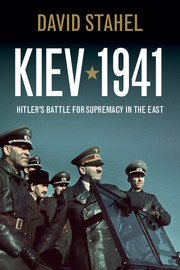Book contents
- Frontmatter
- Contents
- Figures
- Tables
- Maps
- Acknowledgements
- Glossary of terms
- Tables of military ranks and army structures
- Introduction
- 1 The bulldog, the eagle and the bear
- 2 Germany's defeat in the east
- 3 The road to Kiev
- 4 War in the Ukraine
- 5 Ominous horizons
- 6 The battle of Kiev
- 7 Slaughter in the Ukraine
- 8 Visions of victory
- 9 The calm before the storm
- 10 Moscow in the crosshairs
- Conclusion
- Notes
- Bibliography
- Index
Conclusion
Published online by Cambridge University Press: 05 November 2011
- Frontmatter
- Contents
- Figures
- Tables
- Maps
- Acknowledgements
- Glossary of terms
- Tables of military ranks and army structures
- Introduction
- 1 The bulldog, the eagle and the bear
- 2 Germany's defeat in the east
- 3 The road to Kiev
- 4 War in the Ukraine
- 5 Ominous horizons
- 6 The battle of Kiev
- 7 Slaughter in the Ukraine
- 8 Visions of victory
- 9 The calm before the storm
- 10 Moscow in the crosshairs
- Conclusion
- Notes
- Bibliography
- Index
Summary
Establishing the relative importance of a battle is probably a subjective undertaking, destined to evoke disagreement and debate. Yet Kiev was no ordinary battle. From its earliest inception it was fraught with controversy on both the German and the Soviet side, forcing the dictators to impose their views on their respective military commands. In the course of events Zhukov lost his position as the Chief of the Red Army's General Staff and Budenny was replaced as the commander of the South-Western Direction. On the German side Guderian's sudden reversal to support Hitler's preference earned him the enmity of the OKH, while the wider dispute further poisoned the atmosphere between Hitler and the army command. Halder in particular was extremely bitter and would later take every opportunity to blame Hitler for the failure of Operation Barbarossa, although there is no reason to believe that Halder's alternative would have been any more successful. Brauchitsch too was deeply affected. Hitler's scathing attack on the army's leadership shattered Brauchitsch's already feeble confidence, reducing him to a high-level messenger who ferried reports back and forth between commands, but was too cowed to take any independent action that might first require approval from above.
Beyond the effect the battle of Kiev had on the personal and power relationships within the Nazi and Soviet states, the battle, while unable to revive Germany's hopes for outright victory, nevertheless had a major impact on the course of the war in the east. By the end of September Soviet forces in the Ukraine were starved of resources, which gave Rundstedt the advantage in the fighting along the Nogai Steppe and led to the battle on the Sea of Azov. Here two more Soviet armies (the Ninth and Eighteenth) of Lieutenant-General D. I. Riabyshev's Southern Front were caught behind German lines by the rapid southern swing of Kleist's Panzer Group 1. German sources claimed 106,332 Soviet POWs, 212 tanks and 672 guns destroyed or captured. Thereafter the road into the Donbas was open to Kleist, while Manstein's Eleventh Army, which had also played a leading role in the battle, was free to turn south and attack into the Crimea. Further north the major industrial city of Khar'kov, with 840,000 inhabitants, was now also threatened and would soon fall to Reichenau's Sixth Army. Yet in the aftermath of the battle of Kiev the Germans benefited most from the strategic ramifications arising in the north. Throughout July and August Weichs's Second Army as well as major formations from Guderian's panzer group had been tied up holding Bock's long and exposed southern flank. The destruction of the South-Western Front allowed their full commitment to the east, along with the addition of reinforcements from Kleist and Reichenau. With no southern flank to guard, Bock was free to engage in what would become known as the battles of Viaz'ma and Briansk, which were fought at the same time as the battle on the Sea of Azov. At Viaz'ma and Briansk estimates suggest up to a million Soviet men were killed or captured in the first half of October, while seven more Soviet armies were completely destroyed. The ‘twin’ encirclements produced colossal figures that together exceeded the German total at Kiev, but they belonged to a sequence of events that were not mutually exclusive. The battle of Kiev led to the battles at Viaz'ma, Briansk and on the Sea of Azov. As Evan Mawdsley observed in his history of the German--Soviet war, Kiev was the Ostheer's ‘greatest triumph of the war in the East and the Red Army's greatest single disaster’. Similarly, Michael Jones dubbed the battle of Kiev ‘the Wehrmacht's greatest victory of the war’.
- Type
- Chapter
- Information
- Kiev 1941Hitler's Battle for Supremacy in the East, pp. 345 - 354Publisher: Cambridge University PressPrint publication year: 2011



